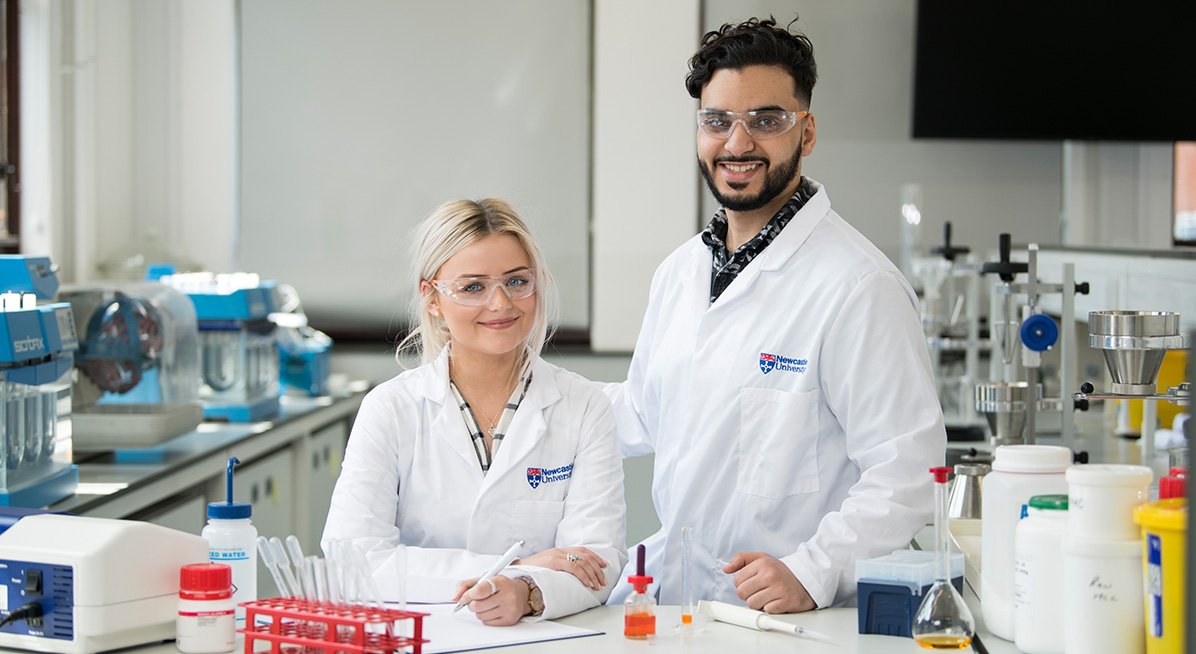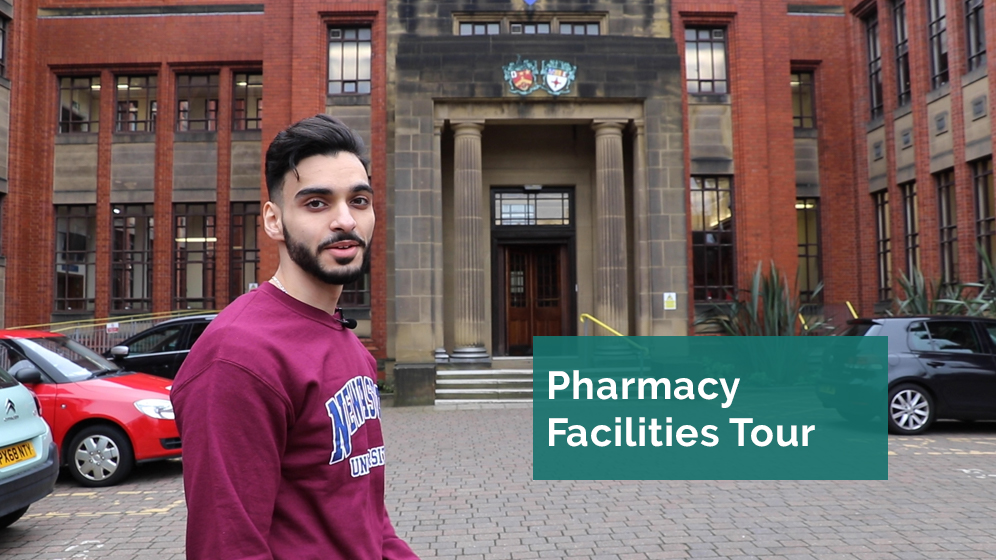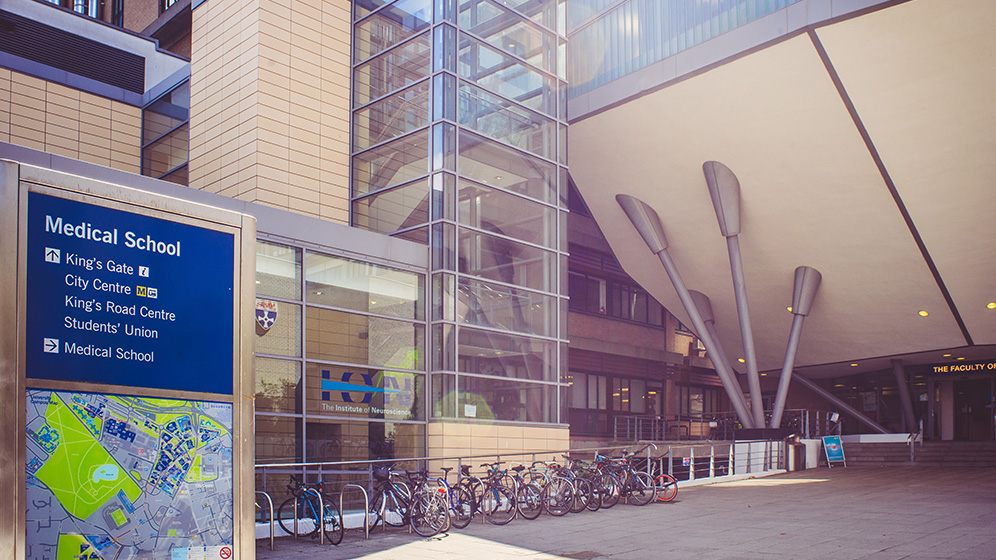Pharmacy MPharm Honours
- UCAS code: B230
- Full time
- 4 years
This accredited Pharmacy degree will prepare you for a career at the forefront of healthcare and medicine.
You are currently viewing course information for entry year: 2026
Next start date:
- September 2026
UCAS Institution name and code:
- NEWC / N21
Course overview
This degree focuses on developing your scientific, technical, clinical and communication skills. You'll leave as a professional, caring, ethical and effective pharmacist, able to contribute to the health of future generations.
Hands-on learning and clinical placements are embedded throughout the degree. You will have access to patients from the start of the course, as well as access to our on-campus skills labs.
You’ll become a confident expert in medicine by learning the fundamentals of the human body and the principles of areas such as:
- pharmaceutical microbiology
- biomedical science
- pathology
- microbiology
Professional accreditation and recognition
This degree has full accreditation from the General Pharmaceutical Council (GPhC).
The GPhC accredits and recognises Pharmacy courses leading to foundation training and then pharmacist registration. After successful completion of your degree, you will need to complete one year of foundation training. After this, you can register with the GPhC and be allowed to practise as a pharmacist in the UK.
All professional accreditations are reviewed regularly by their professional body.
READ MORE

Your course and study experience - disclaimers and terms and conditions
Please rest assured we make all reasonable efforts to provide you with the programmes, services and facilities described. However, it may be necessary to make changes due to significant disruption, for example in response to Covid-19.
View our Academic experience page, which gives information about your Newcastle University study experience for the academic year 2025-26.
See our terms and conditions and student complaints information, which gives details of circumstances that may lead to changes to programmes, modules or University services.
Quality and ranking
Professional accreditation and recognition
All professional accreditations are reviewed regularly by their professional body.
Modules and learning
Modules
The information below is intended to provide an example of what you will study.
Most degrees are divided into stages. Each stage lasts for one academic year, and you'll complete modules totalling 120 credits by the end of each stage.
Our teaching is informed by research. Course content may change periodically to reflect developments in the discipline, the requirements of external bodies and partners, and student feedback.
Optional module availability
Student demand for optional modules may affect availability.
Full details of the modules on offer will be published through the Programme Regulations and Specifications ahead of each academic year. This usually happens in May.
To find out more please see our terms and conditions
Your learning will be focused on patient-orientated problems.
You'll study areas such as the normal structure and function of the human body, pharmacology and medicinal chemistry.
You'll gain professional and practical skills including how to talk to patients, working within healthcare teams and simple examination skills.
You will study pharmaceutical care, such as pathology, and topics such as systems for medicines management.
You will examine abnormal pathology and subsequent therapeutic options to deal with disease. This will be integrated with cutting-edge pharmaceutical science and continued workplace experience.
You'll study applied pharmaceutical interventions such as design and delivery and develop an understanding of how medicines are used concomitantly and how adverse effects are monitored and managed.
You will explore the development of drugs from first principles, and the formulation of injections and implantable medicinal devices. You will also experience more complex patient-based cases.
You'll study targeted therapeutics such as optimisation, critique and responsibility.
You will encounter complex clinical problems and examine specific areas of oncology, infection and immunology.
You'll also learn about state-of-the-art formulation devices used in the delivery of chemotherapy and have the opportunity to choose an area of pharmacy to study as part of a research project.
We base these figures and graphs on the most up-to-date information available to us. They are based on the modules chosen by our students in 2024-25.
Teaching time is made up of:
- scheduled learning and teaching activities. These are timetabled activities with a member of staff present.
- structured guided learning. These are activities developed by staff to support engagement with module learning. Students or groups of students undertake these activities without direct staff participation or supervision
Teaching and assessment
Teaching methods
You'll be taught through:
- lectures
- seminars
- tutorials
- problem-based learning
- practical experience
- laboratory work
- case seminars
These combined methods of teaching are designed to encourage you to develop knowledge and skills in an integrated manner.
You'll be supported in case-led teaching so you are able to confidently apply your knowledge to future work.
Assessment methods
You'll be assessed through a combination of:
-
Assessments
-
Coursework
-
Examinations – practical or online
Skills and experience
Research skills
Undertake a Research Project in your final year. Areas of focus include:
- medicinal chemistry
- pharmacology
- pharmacy practice
- formulation science
- pharmaceutical microbiology
Business skills
Gain hands-on learning through a range of experiential opportunities throughout the degree and access to patients from day one.
Embedding these opportunities at all stages of the course will give you the skills to excel as a pharmacist and effectively contribute to high-quality patient care to improve the lives of millions.
Practical skills
Reinforce your learning through:
- on-site visits to local hospitals
- practical sessions in our on-campus pharmacy labs, clinical skills suites and anatomy and biochemistry labs
- working and training alongside professionals and students within the Faculty of Medical Sciences
Clinical placements and experience
Clinical placements are a key element of your degree and an essential part of preparation for clinical practice.
On placement, you'll have a diverse range of clinical experiences. This will introduce you to the many and varied roles that qualified pharmacists can undertake.
The placements help you develop a sense of identity as a pharmacist and identify your interests. They are also an opportunity for you to gain, develop and craft your practical knowledge and skills.
You'll also engage in hospital-based learning, and interprofessional education at Newcastle.
Facilities and environment
Facilities
Our School is part of the Faculty of Medical Sciences, which is also home to Dentistry, Medicine, Psychology and Biomedical Sciences, encouraging inter-professional collaboration.
You'll have access to newly refurbished pharmacy laboratories in the historic red-brick George VI Building, in our city-centre campus. You'll also benefit from:
- a clinical skills suite, anatomy lab and biochemistry lab in the Medical School
- specialist medicinal chemistry facilities
- access to the hospital environment through our close proximity to the Newcastle Hospitals NHS Foundation Trust
Support
You'll have the support of an academic member of staff as a personal tutor throughout your degree to help with academic and personal issues.
Peer mentors will help you in your first year. They are fellow students who can help you settle in and answer any questions you have when starting university.
Your future
Pharmacy is a highly varied profession with a number of different possible career paths open to graduates.
To register as a pharmacist in the UK, you must complete the MPharm degree, a foundation training year and sit the registration assessment. After registration, pharmacy graduates are highly sought after and are amongst the most employable professionals in the UK, with many opportunities to work internationally.
Career paths include:
- community pharmacist
- hospital pharmacist
- industrial pharmacist
- emerging roles, including working in GP practices and care homes
Make a difference
Sorry, you need JavaScript to view this video
Careers support
Our Careers Service is one of the largest and best in the country, and we have strong links with employers. We provide an extensive range of opportunities to all students through our ncl+ initiative.
Visit our Careers Service website
Recognition of professional qualifications outside of the UK
If you’re studying an accredited degree and thinking about working in Europe after you graduate, the best place to find current information is the UK Government’s guidance on recognition of UK professional qualifications in EU member states. This official resource explains whether your profession is regulated in another country, what steps you need to take, and which organisation you should contact.
Entry requirements
All candidates are considered on an individual basis and we accept a broad range of qualifications.
The entrance requirements and offers below apply to 2026 entry.
| A-Level | |
|---|---|
| International Baccalaureate | |
|---|---|
Other UK and the Republic of Ireland qualifications
Alternative offers at Newcastle
Through one of our contextual or alternative offer routes, you could receive an offer of up to three grades lower than the typical requirements.
Contextual offers
We use certain contextual data from your UCAS form, alongside your application, to consider challenges that you may have faced in your education and the potential effect this may have had on your qualifications. This means you may be eligible to receive a lower contextual offer.
PARTNERS offers
One of the largest and longest support entry routes to university of its kind for students from underrepresented backgrounds. We support applicants from application through to study.
Realising Opportunities offers
A unique programme delivered in collaboration with 10 leading, research-intensive universities in the UK. The programme is open to students in Year 12/first year of college.
Pathways to Newcastle offers
Pathways to Newcastle, our national skills entry route, is available for specific subject areas.
High Performance Athletes
We support promising athletes at the application stage, who compete in regional, national or international levels in their sport.
Qualifications from outside the UK
English Language requirements
Entrance courses (INTO)
International Pathway courses are specialist programmes designed for international students who want to study in the UK. We provide a range of study options for international students in partnership with INTO.
These courses are specifically designed for international students who want to study in the UK and progress onto one of our undergraduate degrees. Our International Study Centre, has a range of study options including:
- International Foundation
- International Year One
- English Language courses
Find out more about International Pathway courses
Admissions policy
This policy applies to all undergraduate and postgraduate admissions at Newcastle University. It is intended to provide information about our admissions policies and procedures to applicants and potential applicants, to their advisors and family members, and to staff of the University.
University Admissions Policy and related policies and procedures
Credit transfer and Recognition of Prior Learning
Recognition of Prior Learning (RPL) can allow you to convert existing relevant university-level knowledge, skills and experience into credits towards a qualification. Find out more about the RPL policy which may apply to this course.
Fitness to Practise requirements
Applicants must satisfy Fitness to Practise requirements on admission to the course.
This includes a health declaration and submission of an acceptable disclosure and barring service (DBS) clearance.
Students coming direct to the course from a country outside of the UK must provide a letter of good conduct from their home country and will be required to submit an acceptable DBS at the end of the first year.
Tuition fees and scholarships
Tuition fees for academic year 2026-2027
The 2026 entry home fees have not yet been confirmed.
| Qualification: MPharm Honours | |
|---|---|
|
Home students full time 4 years |
Tuition fees (Year 1)
Not set |
|
International students full time 4 years |
Tuition fees (Year 1)
30,300 |
Year abroad and additional costs
For programmes where you can spend a year on a work placement or studying abroad, you will receive a significant fee reduction for that year.
Some of our degrees involve additional costs which are not covered by your tuition fees.
Scholarships
Find out more about:
Open days and events
You'll have a number of opportunities to meet us throughout the year at our on-campus and virtual open days.
You'll be able to:
- explore our beautiful campus
- find out about our vibrant city
- discover what students think about studying at Newcastle
You'll also have the opportunity to speak to academic staff and find out more about the subjects you're interested in.
Find out about how you can visit Newcastle in person and virtually.
We regularly travel overseas to meet with students interested in studying at Newcastle University. Visit our events calendar to find out when we're visiting your region.
How to apply
Apply through UCAS
To apply for undergraduate study at Newcastle University, you must use the online application system managed by the Universities and Colleges Admissions Service (UCAS). All UK schools and colleges, and a small number of EU and international establishments, are registered with UCAS. You will need:
- the UCAS name and institution codes for Newcastle University (NEWC/N21)
- the UCAS code for the course you want to apply for
- the UCAS 'buzzword' for your school or college
If you are applying independently, or are applying from a school or college which is not registered to manage applications, you will still use the Apply system. You will not need a buzzword.
Apply through UCASApply through an agent
International students often apply to us through an agent. Have a look at our recommended agents and get in touch with them.
Additional information
For more information on the interviews, please see our process document (PDF: 146KB).
You might also like to read our School of Pharmacy Admission Protocol (PDF: 201KB).
Important application information
We are no longer accepting applications for this course from home students for 2024 entry.
Get in touch
By phone
Call us on +44 (0) 191 208 3333 and press option 1. Our opening hours are Monday to Friday 10am until 4pm.
Live chat
Our NCL chatbot might be able to give you an answer straight away. If not, it’ll direct you to someone who can help.
You'll find our NCL chatbot in the bottom right of this page.
Online
Keep updated
We regularly send email updates and extra information about the University.
Receive regular updates by email






